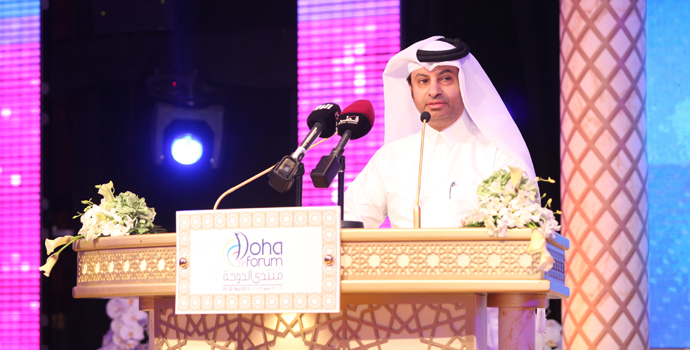


The international guests of honor this year will include some current Heads of State and Government. The Forum will also feature other distinguished opinion leaders, eminent political thinkers, decision – makers and members of parliament, renowned businessmen, academics, media figures and international organizations. These participants will contribute to a free, learned and stimulating debate on each of the many topics on the Forum's agenda, with a focus on the Arab Spring, the global financial and economic crisis, International Cooperation, Global Economy, Development, Human Rights and Digital Media.
The 13th Doha Forum will be held at the Ritz Carlton Hotel in the State of Qatar from 20-22 May, 2013. It will be attended by more than 600 participants representing over 80 countries and organizations.
Closing Remarks: HE Sheikh Ahmed Bin Mohammed Bin Jabr Al-thani
Assistant Minister for International Cooperation
Chair of the Permanent Committee for Organizing Conferences

Your excellencies, distinguished guests, thank you all for coming to the 13th Doha Forum.
Over the past three days, we have benefited from a rich exploration and discussion on a range of issues of global interest.
In his speech, HH the Amir Sheikh Hamad bin Khalifa Al Thani identified five main pillars that we should bear in mind: people calling for widespread reform, political participation, poverty, unemployment and human rights violations. All these should be taken into consideration.
We have received the thoughts and observations from current heads of state and head of government; from
former political leaders and from leading experts from around the world, all of whom have contributed to what makes the Doha Forum such an important event.
We all know that the world is becoming more interconnected, that we face problems that do not respect national boundaries nor regional areas. So many of the challenges we face are global in nature and the range of contributors reflected this fundamental aspect.
Without question, the humanitarian plight of the Syrian people has loomed large over this conference. In his opening address, His Highness the Emir Shiekh Hamad bin Khalifa Al Thani reiterated his call for international action to resolve this profound crisis in the heart of the Middle East. This was a call shared by many others,
from former French Prime Minister, Francois Fillon, to Ambassador Ischinger from the Munich Security Conference, who drew from his previous experience in the Balkans to cite the further destructive potential from the on-going instability in the heart of the Levant.
After the Emir’s opening address, Africa was the broad theme of this year’s opening session, with Senegal’s President Macky Sall and Tunisian Prime Minister Ali Lareydh, the Forum’s guests of honour.
President Sall, noting the major changes occurring in the global economy, highlighted the range of investment opportunities in Sub-Saharan African, with the African Union having earmarked $68 billion of infrastructure projects. Calling for greater trade and investment between Africa and the Arab World, President Sall also
touched upon plans for the forthcoming G20 meeting for more private sector support in African infrastructure.
The Arab Spring was another major theme throughout this conference. We were proud to welcome Tunisian Prime Minister Ali Lareyedh, who provided the Forum with his insight into progress in his country since 2011. He emphasised that Tunisia is still going through a transitional phase, but the people of Tunisia were focused on building a civic state that is neither religious nor military and protects and upholds human rights.
The Doha Forum also looked at key economic matters, with former British Prime Minister, Gordon Brown making an impassioned call for a Middle East and North Africa development bank. As many participants noted in later sessions, events that have became known as the Arab Spring had economic as well as political roots - Gordon Brown’s plea for greater investment in many of the coutnries affected was a constructive call to address two fundamental regional challenges to stability; low economic growth and high youth unemployment.
Looking at the on-going effects of the economic crisis, Argentina’s Vice President Amado Boudou gave a strong argument against austerity measures, citing its potential to have a counterproductive effect on national economies and levels of poverty.
The issue of low economic growth in the Arab world was explored in further depth over the course of this year’s Forum. Participants in the second session called for the removal of trade barriers and for the improvement of intellectual property rights as part of efforts to boost development in the region. Some participants argued that current regulatory barriers were stymieing the entrepreneurial spirit of people in the Middle East, with others noting the enhancing the role of women would also play a key role in regional economic advancement.
The changing world order and the complexities of the various new dynamics were also discussed at length at this year’s Doha Forum. Participants, including former French Foreign Minister, Hubert Vedrine, remarked upon the relative decline in American power, as more states rise in influence, both politically and economically. This diffusion of power in global affairs was highlighted as both an opportunity and challenge for all states. Looking at the Gulf in particular, Former US Ambassador Richard LeBaron noted that US relations with the region were undergoing a period of change and that states in the region may have to adjust their approach to accommodate this shift in dynamic.
On the second day of the Forum, we saw further examination of the challenges facing the new democracies in the Arab world. Participants expressed concern over the durability of the revolutions that have occurred so far; returning to the need to place as much emphasis on socio-economic issues as political ones in any country’s development. The requirement for active and widespread investment as well as moves to definitively address corruption were given prominence in discussions.
Doubts were also expressed about the democratic nature of the new governments emerging, with Abdul Aziz bin Othman Sager, head of the Gulf Studies Center, remarking on the risk of new elites forming that entrench power rather than accede to true democratic principles, as defined by the West. But, other contributors warned against exaggerating perceived threats from Islamist movements. Sudan’s former Foreign Minister, Mustafa Osman Ismail, argued that all new governments will be measured by the same standards as any other government and, with greater power invested in the people in these states, it will be difficult for these new governments to apply approaches and policies similar to those previously deposed. Ambassador Neto from Brazil also drew on his region’s experience in democratic development to also strike a positive tone. He argued for patience, noting that new democracies require time to build the necessary institutions, but the Latin American experience showed that it was possible to succeed.
In the seventh session of the day, organised with the Qatar University, participants described the unstoppable force of digital communications and the impact it is having on Governments as well as traditional media. As the director for the US-based Center for Public Diplomacy, Philip Seib put it, in terms of communication, ‘the social contract’ between the Government and its people is being rewritten, with greater engagement with public officials expected by people communicating online.
The ability for digital media to mobilise and rally people was also explored, returning again to the Arab Spring as a source, but also looking at the way digital media is being used to divide people in the region through incitement.
The impact of the financial crisis on human rights was examined in the last session of the second day at the Forum. While participants noted the benefits that globalisation had brought it was also noted that its impacts had been severe in many cases for human rights. This session touched on issues of human trafficking and migrant labour, while speakers also called a new approach to ensure that humanitarian considerations are accounted for in the global economic system.
For this year’s final session, we were happy to welcome the participation of the Brookings Doha Center to run a session for the first time. With its impressive range of guests and the lively discussion we all heard this morning, I think its examination of the central challenge for Arab Spring states – effectively managing the transition process; building new institutions, while preserving necessary elements of the old – was fitting end to another Doha Forum.
I would like to thank all of the participants for their insightful contributions and engaged debate.
This is why we host this event - to provide a unique opportunity to explore current trends in global affairs and prospective policies to meet the challenges of a dramatically changing world order.
There is no doubt over the three days that we achieved exactly that.
Finally, I would like to thank UCLA for its wonderful contribution to this whole event through the accompanying ‘Enriching the Middle East’s Economic Future’ conference. Allow me to introduce Professor Steven Spiegel, who will give his closing remarks.
